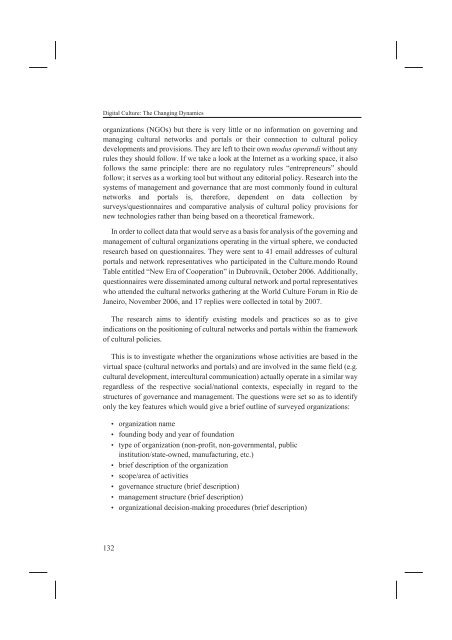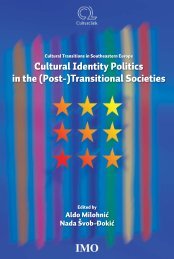D:\Documents and Settings\Ana\My Documents\Biserka-knjiga ...
D:\Documents and Settings\Ana\My Documents\Biserka-knjiga ...
D:\Documents and Settings\Ana\My Documents\Biserka-knjiga ...
Create successful ePaper yourself
Turn your PDF publications into a flip-book with our unique Google optimized e-Paper software.
Digital Culture: The Changing Dynamics<br />
organizations (NGOs) but there is very little or no information on governing <strong>and</strong><br />
managing cultural networks <strong>and</strong> portals or their connection to cultural policy<br />
developments <strong>and</strong> provisions. They are left to their own modus oper<strong>and</strong>i without any<br />
rules they should follow. If we take a look at the Internet as a working space, it also<br />
follows the same principle: there are no regulatory rules “entrepreneurs” should<br />
follow; it serves as a working tool but without any editorial policy. Research into the<br />
systems of management <strong>and</strong> governance that are most commonly found in cultural<br />
networks <strong>and</strong> portals is, therefore, dependent on data collection by<br />
surveys/questionnaires <strong>and</strong> comparative analysis of cultural policy provisions for<br />
new technologies rather than being based on a theoretical framework.<br />
In order to collect data that would serve as a basis for analysis of the governing <strong>and</strong><br />
management of cultural organizations operating in the virtual sphere, we conducted<br />
research based on questionnaires. They were sent to 41 email addresses of cultural<br />
portals <strong>and</strong> network representatives who participated in the Culture.mondo Round<br />
Table entitled “New Era of Cooperation” in Dubrovnik, October 2006. Additionally,<br />
questionnaires were disseminated among cultural network <strong>and</strong> portal representatives<br />
who attended the cultural networks gathering at the World Culture Forum in Rio de<br />
Janeiro, November 2006, <strong>and</strong> 17 replies were collected in total by 2007.<br />
The research aims to identify existing models <strong>and</strong> practices so as to give<br />
indications on the positioning of cultural networks <strong>and</strong> portals within the framework<br />
of cultural policies.<br />
This is to investigate whether the organizations whose activities are based in the<br />
virtual space (cultural networks <strong>and</strong> portals) <strong>and</strong> are involved in the same field (e.g.<br />
cultural development, intercultural communication) actually operate in a similar way<br />
regardless of the respective social/national contexts, especially in regard to the<br />
structures of governance <strong>and</strong> management. The questions were set so as to identify<br />
only the key features which would give a brief outline of surveyed organizations:<br />
132<br />
• organization name<br />
• founding body <strong>and</strong> year of foundation<br />
• type of organization (non-profit, non-governmental, public<br />
institution/state-owned, manufacturing, etc.)<br />
• brief description of the organization<br />
• scope/area of activities<br />
• governance structure (brief description)<br />
• management structure (brief description)<br />
• organizational decision-making procedures (brief description)



